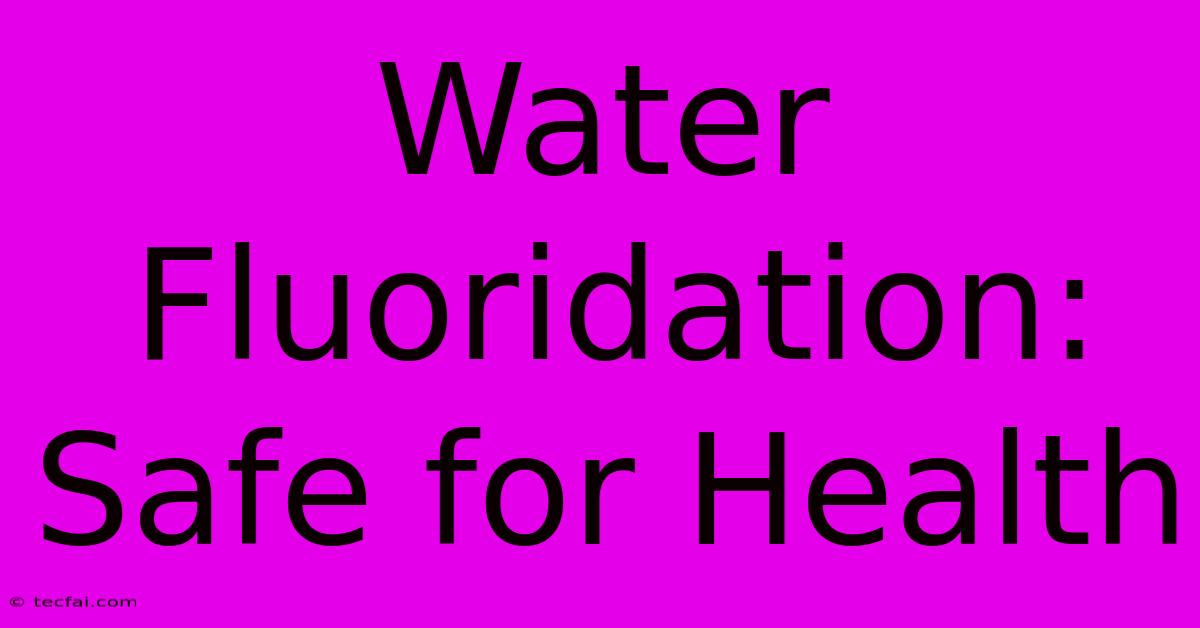Water Fluoridation: Safe For Health

Discover more detailed and exciting information on our website. Click the link below to start your adventure: Visit Best Website tecfai.com. Don't miss out!
Table of Contents
Water Fluoridation: Safe for Health
Water fluoridation, the process of adding fluoride to public water supplies, remains a topic of debate. However, a substantial body of scientific evidence supports its safety and effectiveness in preventing tooth decay, a significant public health concern. This article will explore the evidence supporting the safety of water fluoridation, addressing common concerns and misconceptions.
The Decades-Long History of Fluoridation's Safety
The practice of water fluoridation has been implemented for over 70 years, with extensive research consistently demonstrating its benefits. Organizations like the Centers for Disease Control and Prevention (CDC) and the World Health Organization (WHO) endorse water fluoridation, recognizing its crucial role in public health. This long-term use and consistent endorsement highlight the safety profile of this widely adopted public health measure.
Decades of Research: A Consistent Positive Impact
Multiple systematic reviews and meta-analyses have consistently shown that communities with fluoridated water experience significantly lower rates of dental caries (cavities) compared to those without. This reduction in cavities translates to better oral health and reduced healthcare costs associated with dental treatments. The sheer volume of research, spanning decades and numerous independent studies, strongly supports the safety and efficacy of fluoridation.
Addressing Common Concerns and Misconceptions
Despite the overwhelming scientific consensus, concerns regarding water fluoridation persist. Let's address some of the most prevalent misconceptions:
Myth 1: Fluoride is a Toxic Substance
While fluoride, like many substances, can be toxic in high doses, the concentration added to drinking water is incredibly low – far below the level that poses any significant health risk. The amount of fluoride ingested through fluoridated water is minute and well within the safety guidelines established by health authorities. It's crucial to differentiate between the beneficial, controlled intake of fluoride in water and accidental ingestion of high concentrations.
Myth 2: Fluoride Causes Health Problems
Claims linking water fluoridation to various health problems, such as cancer, bone fractures, or neurological issues, lack credible scientific evidence. Numerous studies have investigated these potential links and found no causal relationship. The consistent findings from these studies debunk the claims suggesting negative health consequences from optimally fluoridated water.
Myth 3: Fluoride is Unnecessary with Good Oral Hygiene
While good oral hygiene practices—brushing, flossing, and regular dental check-ups—are essential, they don't entirely eliminate the risk of cavities. Water fluoridation acts as a supplemental protective measure, benefiting everyone, especially children, who may not consistently practice optimal oral hygiene. It provides an additional layer of protection against tooth decay, working synergistically with other preventative measures.
Conclusion: A Safe and Effective Public Health Strategy
The overwhelming scientific consensus supports the safety and efficacy of water fluoridation as a vital public health measure. Decades of research, consistent positive results, and endorsements from leading health organizations firmly establish its benefits in reducing tooth decay. Addressing common concerns through factual information and highlighting the positive impact on public health are crucial to maintaining public trust in this effective and safe method of improving oral health. The slight risk associated with fluoridation is significantly outweighed by its proven benefits in reducing dental disease and improving the oral health of entire communities.

Thank you for visiting our website wich cover about Water Fluoridation: Safe For Health. We hope the information provided has been useful to you. Feel free to contact us if you have any questions or need further assistance. See you next time and dont miss to bookmark.
Featured Posts
-
Euro Millions Live 158m Lottery Numbers
Nov 23, 2024
-
Dianne On Chriss Exciting Career Change
Nov 23, 2024
-
Pat King Guilty In Freedom Convoy Case
Nov 23, 2024
-
Former East Enders Actor In New Soap Role
Nov 23, 2024
-
Loeffler Usda Pick Reports Say
Nov 23, 2024
